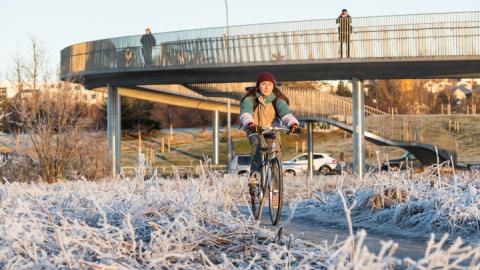Climate change

Reykjavík City aims to become carbon neutral by 2030, while making sure the changes needed to address climate change are made in an environmentally friendly and people-centered way. We support the goal of the Paris Agreement to maintain global warming within 1.5 degrees Celsius.
The City of Reykjavík has been selected to be part of a European project along with more than 100 other cities to become carbon neutral by 2030. Participation involves creating a Climate City Contract with various stakeholders in Icelandic society. This contract outlines actions to achieve the ambitious goal together.
What do you want to explore?
- Climate City Contract Do you want to know more about the Climate City Contract?
- Youth Climate Action Fund in Reykjavík Are you 15-24 years old and want to help tackle climate change?
- Greenhouse gas emissions Community greenhouse gas emissions in Reykjavík.
- Climate Change Knowledge Hub Fair transition in climate change issues
Climate Action Plan
City of Reykjavík Climate Action Plan for 2021-2025

Climate statistics
Reykjavík City climate statistics 2023
Older statistics
Reykjavík City Green Accounting
Green accounting for fossil fuel use, thermal spring water, energy, greenhouse gas emissions and waste volume in Reykjavík City operations.
Adaptation to climate change
Nearly 300,000 tonnes by 2030
The City of Reykjavík aims for carbon neutrality by 2040. The biggest challenge in achieving carbon neutrality is the need to quickly reduce emissions. The 2021-2025 Action Plan outlines the wide range of projects needed to create a carbon-neutral society.
This plan includes many important and minor actions, developed after extensive consultations. These actions were summarized into 15 main actions aimed to reduce carbon emissions by about 300,000 tonnes by 2030.
Six priorities
The Action Plan has six priorities that the City considers essential for reaching the carbon neutrality goals. These are:
- Walkable city
- Energy transition
- Health enhancing commutes
- Circular economy principles
- Green buildings
- Carbon sequestration
In addition to these six priorities, there are other related important and supportive factors. They are:
- Adaptation to climate change
- Awareness and innovation
- Reykjavík City operations
Climate Agreement
The City of Reykjavík has been selected to be part of a European project along with more than 100 other cities to become carbon neutral by 2030. As part of the project, the City of Reykjavík is making a climate agreement with different groups in Icelandic society to figure out how to reach this goal together.

Decade of action
The time to take action on climate change is now, and we don't have a moment to waste in stopping man-made climate change and avoiding the disasters it will cause.
The City of Reykjavík's Climate Policy guides the work for the next five years, with a goal of reducing greenhouse gas emissions by 2030.
The Climate Policy supports the Reykjavík City Green Deal for creating a carbon-neutral city and investing in green initiatives for the next 10 years. Now that the Policy has been approved, the next step is assess quantities, costs, and the timing of each action. This includes estimating the amount of CO2 each action will reduce, the cost, and when it will be completed.
The goal of these actions is for the City of Reykjavík to help meet the Paris Agreement's target of limiting global warming to 1.5 degrees Celsius.
Listening to residents and stakeholders
The Climate Policy was developed with input from residents and stakeholders. At the start of the process, people were invited to propose actions and workshops were held.

International commitments
The City of Reykjavík has been a part of the Covenant of Mayors for Climate & Energy since 2011. The Covenant of Mayors invited parties to join the Climate Change Adaptation Partnership in 2014, and the City of Reykjavík decided to participate.
Additionally, the City of Reykjavík is involved in the Carbon Disclosure Project (CDP), where information on its carbon usage is made publicly available.
The City of Reykjavík is working with other Nordic capital cities on a joint declaration about climate change.
Climate and individuals
Individuals can also play a role by reviewing their transportation choices and reducing the use of fossil fuels. We can also reduce waste, and recycle, as much as possible.
Climate recognition and declaration
Reykjavík City and Festa have awarded Icelandic companies with climate recognition and encouraged them to sign a climate declaration. The goal is to strengthen collaboration with the Icelandic economy, draw positive attention to commendable actions, and to urge companies to set goals in climate change issues.
Prioritizing green economic growth
In recent years, Reykjavík City has systematically worked for improvement in environmental issues in the city, introduced sustainable operations, and emphasized green investments that have enhanced the environment and quality of life for city residents.
Notably, the Reykjavík Biking Plan and the 2010-2030 Reykjavík Municipal Plan both focus on preserving green spaces, making cities more compact, improving public transportation, finding eco-friendly ways to dispose of waste, and ensuring new construction is environmentally friendly.
Green investments are expected to make up about 24% of the City's total investments over the next 5 years. These investments include making open spaces, improving pedestrian paths, creating priority bus routes, renovating waste containers, and more.
Climate Change Knowledge Hub
Climate change is one of the biggest issues of our time, but the effects of climate change can affect people differently depending on their social status. Here is a mapping of the gender and equality perspectives to take into account when working towards becoming a carbon neutral society.






